|
Books Should Be Free Loyal Books Free Public Domain Audiobooks & eBook Downloads |
|
|
Books Should Be Free Loyal Books Free Public Domain Audiobooks & eBook Downloads |
|
Psychology Books |
|---|
|
Book type:
Sort by:
View by:
|
By: Mark Phillips (Randall Garrett and Laurence M. Janifer) | |
|---|---|
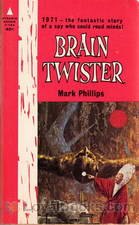 Brain Twister
Brain Twister
“Mark Phillips” is, or are, two writers: Randall Garrett and Laurence M. Janifer. Their joint pen-name, derived from their middle names (Philip and Mark), was coined soon after their original meeting, at a science-fiction convention. Both men were drunk at the time, which explains a good deal, and only one has ever sobered up. A matter for constant contention between the collaborators is which one. Originally published as That Sweet Little Old Lady, Brain Twister follows the adventures of FBI agent Kenneth J... | |
By: Elliott O’Donnell (1872—1965) | |
|---|---|
 Animal Ghosts
Animal Ghosts
Summary: This is a collection of ghost stories in which the antagonists are various animals. Divided up into chapters of ghost sightings by each group of animals, you will hear of hauntings by dogs, cats, birds, jungle animals, etc. (Summary by Allyson Hester) | |
By: Elsie Lincoln Benedict | |
|---|---|
 How to Analyze People on Sight Through the Science of Human Analysis: The Five Human Types
How to Analyze People on Sight Through the Science of Human Analysis: The Five Human Types
In this popular American book from the 1920s, accomplished public speaker and self-help charlatan Elsie Lincoln Benedict outlines her pseudo-scientific system of "Human Analysis". She proposes that, within the human race, five sub-types have developed through evolutionary processes, each with its own distinct character traits and corresponding outward appearance. She offers to teach the reader how to recognise these five types of people and understand their innate differences. Her ideas have never been taken seriously by the scientific community, but this book is considered a classic within its genre and remains in print today. Summary by Carl Manchester. | |
By: Thomas Henry Huxley (1825-1895) | |
|---|---|
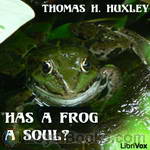 Has a Frog a Soul?
Has a Frog a Soul?
Thomas Huxley, known as “Darwin’s Bulldog” for his championing and development of Darwinism, was perhaps the most important Victorian biologist after Darwin himself. This speech to the Metaphysical Society in 1870 is one of Huxley’s best known texts outside the sphere of his specialism, and remains read today by students of philosophy. In it, Huxley argues from the results of vivisection to metaphysics. | |
By: William Walker Atkinson (1862-1932) | |
|---|---|
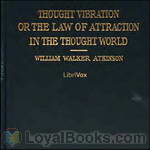 Thought Vibration, or The Law of Attraction in the Thought
Thought Vibration, or The Law of Attraction in the Thought
William Walker Atkinson (December 5, 1862 – November 22, 1932) was an attorney, merchant, publisher, and author, as well as an occultist and an American pioneer of the New Thought movement.Atkinson was a prolific writer, and his many books achieved wide circulation among New Thought devotees and occult practitioners. He published under several pen names, including Magus Incognito, Theodore Sheldon, Theron Q. Dumont, Swami Panchadasi, Yogi Ramacharaka, Swami Bhakta Vishita, and probably other names not identified at present... | |
 Hindu-Yogi Science Of Breath
Hindu-Yogi Science Of Breath
Increase your awareness about the forgotten art of breathing as researched, practiced and written by our Eastern brothers. Inside you will find how our Western society has perhaps forgotten the proper way to breath, hence leaving us more susceptible to disease and poor health. This book explains in layman's terms what happens inside our bodies when we inhale and then exhale. And the effects improper breathing has on both our internal and external extremities. It describes nature's proximity for the respiratory, and circulatory systems. The final sections include invaluable Yogi breathing exercises for increased breathing awareness and better health. Salaam. (Mike Justice) | |
By: Robert Burton (1577-1640) | |
|---|---|
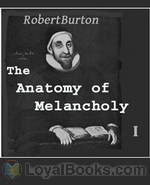 The Anatomy of Melancholy
The Anatomy of Melancholy
The Anatomy of Melancholy is a book by Robert Burton, first published in 1621. On its surface, the book is a medical textbook in which Burton applies his large and varied learning in the scholastic manner to the subject of melancholia (which includes what is now termed clinical depression). Though presented as a medical text, The Anatomy of Melancholy is as much a sui generis work of literature as it is a scientific or philosophical text, and Burton addresses far more than his stated subject. In... | |
By: Maria Montessori (1870-1952) | |
|---|---|
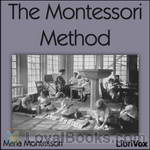 The Montessori Method
The Montessori Method
In the early 1900’s Dr. Maria Montessori began to reform educational methods with her work the ‘Case dei Bambini’ in Rome, Italy. Montessori began her work by developing methods to educate mentally retarded children, the method she developed was used with several children who at age eight took the state examinations in reading and writing, the children passed with above average scores. Because of this success (which is known as the ‘first Montessori Miracle’) Dr. Montessori was asked to open a school for children in Rome which she did... | |
 Dr. Montessori's Own Handbook
Dr. Montessori's Own Handbook
This is the authoritative book written by Montessori to describe her methods. It gives an overview of the Montessori Method as developed for 3 to 6 year olds. It is a short work, intended as a manual for teachers and parents, detailing the materials used as well as her philosophy in developing them. "As a result of the widespread interest that has been taken in my method of child education, certain books have been issued, which may appear to the general reader to be authoritative expositions of the Montessori system... | |
By: Charles Mackay (1814-1889) | |
|---|---|
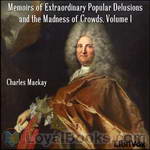 Memoirs of Extraordinary Popular Delusions and the Madness of Crowds
Memoirs of Extraordinary Popular Delusions and the Madness of Crowds
The book chronicles and vilifies its targets in three parts: “National Delusions”, “Peculiar Follies”, and “Philosophical Delusions”.The subjects of Mackay’s debunking include alchemy, beards (influence of politics and religion on), witch-hunts, crusades and duels. Present day writers on economics, such as Andrew Tobias, laud the three chapters on economic bubbles. | |
By: George Berkeley (1685-1753) | |
|---|---|
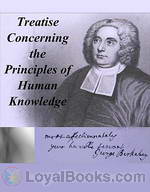 A Treatise Concerning the Principles of Human Knowledge
A Treatise Concerning the Principles of Human Knowledge
A Treatise Concerning the Principles of Human Knowledge, Part 1 (Commonly called “Treatise” when referring to Berkeley’s works) is a 1710 work by the Irish Empiricist philosopher George Berkeley. It largely seeks to refute the claims made by his contemporary John Locke about the nature of human perception. Both Locke and Berkeley agreed that there was an outside world, and it was this world which caused the ideas one has within one’s mind. Berkeley sought to prove that the outside world was also composed solely of ideas, suggesting that “Ideas can only resemble Ideas”... | |
By: Théodule Ribot (1839-1916) | |
|---|---|
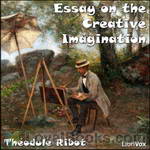 Essay on the Creative Imagination
Essay on the Creative Imagination
“It is quite generally recognized that psychology has remained in the semi-mythological, semi-scholastic period longer than most attempts at scientific formulization. For a long time it has been the “spook science” per se, and the imagination, now analyzed by M. Ribot in such a masterly manner, has been one of the most persistent, apparently real, though very indefinite, of psychological spooks. Whereas people have been accustomed to speak of the imagination as an entity sui generis, as a... | |
By: Havelock Ellis (1859-1939) | |
|---|---|
 Studies in the Psychology of Sex, Volume One
Studies in the Psychology of Sex, Volume One
The first of six volumes, this volume covers in extensive detail the topics of "The Evolution of Modesty", "The Phenomena of Sexual Periodicity", and "Auto-Eroticism". Written as an anthropological and psychological study from the point of view of Havelock, the famous British sexologist of the late 19th century, who was also a physician and social reformer. | |
By: T. F. Thiselton Dyer (1848-1923) | |
|---|---|
 Strange Pages from Family Papers
Strange Pages from Family Papers
“Among other qualities which have been supposed to belong to a dead man’s hand, are its medicinal virtues, in connection with which may be mentioned the famous ‘dead hand,’ which was, in years past, kept at Bryn Hall, Lancashire… Thus the case is related of a woman who, attacked with the smallpox, had this dead hand in bed with her every night for six weeks, and of a poor lad living near Manchester who was touched with it for the cure of scrofulous sores.” Though not all chapters have such gruesome subjects as The Dead Hand, all are full of a curious mixture of superstition and local history that will delight and amuse the modern listener. | |
By: William Healy, Mary Healy | |
|---|---|
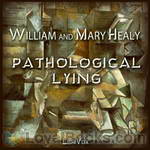 Pathological Lying, Accusation, and Swindling – A Study in Forensic Psychology
Pathological Lying, Accusation, and Swindling – A Study in Forensic Psychology
This work describes and analyzes several cases of pathological behavior. The interest comes not only from the cases themselves, but also from the of-its-time analysis which is mired in what we now know to be wrong thinking about mental illness, sexuality, gender, and race. - written by Mary Schneider | |
By: Baron Paul Henri Thiry d'Holbach (1723-1789) | |
|---|---|
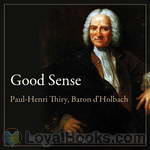 Good Sense
Good Sense
In 1770, Baron D'Holbach published his masterpiece, "Systeme de la Nature", which for a long time passed as the posthumous work of M. de Mirabaud. That text-book of "Atheistical Philosophy" caused a great sensation, and two years later, 1772, the Baron published this excellent abridgment of it, freed from arbitrary ideas; and by its clearness of expression, facility, and precision of style, rendered it most suitable for the average student. This text is based on an undated English translation of "Le Bon Sens" published c. 1900. The name of the translator was not stated. | |
By: Gautama Buddha (563-483 BC) | |
|---|---|
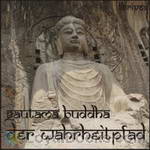 Der Wahrheitpfad (Dhammapadam)
Der Wahrheitpfad (Dhammapadam)
Das Dhammapada ist eine Anthologie von Aussprüchen des Buddha. Dabei sind die Verse so ausgewählt, dass sie den Kern der Lehre des Buddha wiedergeben. Es ist einer der bekanntesten Texte dieser Lehre und findet seine weiteste Verbreitung im südlichen Buddhismus. Dort begleitet es die Schüler des Buddha vom Anfang bis zum Ende ihres Pfades. Darüber hinaus ist es ein Meisterwerk sowohl der frühen buddhistischen Literatur als auch der indischen Tradition des Karvya (Belle Lettre). | |
By: John Addington Symonds (1840-1893) | |
|---|---|
 A Problem in Modern Ethics
A Problem in Modern Ethics
“Society lies under the spell of ancient terrorism and coagulated errors. Science is either wilfully hypocritical or radically misinformed.” John Addington Symonds struck many an heroic note in this courageous (albeit anonymously circulated) essay. He is a worthy Virgil guiding the reader through the Inferno of suffering which emerging medico-legal definitions of the sexually deviant were prepared to inflict on his century and on the one which followed. Symonds pleads for sane human values in... | |
By: Hugo Münsterberg (1863-1916) | |
|---|---|
 Psychotherapy
Psychotherapy
Talking about viewing the Ocean "If I take the attitude of appreciation, it would be absurd to say that this wave is composed of chemical elements which I do not see; and if I take the attitude of physical explanation, it would be equally absurd to deny that such elements are all of which the wave is made. From the one standpoint, the ocean is really excited; from the other standpoint, the molecules are moving according to the laws of hydrodynamics. If I want to understand the meaning of this scene every reminiscence of physics will lead me astray; if I want to calculate the movement of my boat, physics alone can help me".(from the Introduction) | |
By: Clarence Darrow (1857-1938) | |
|---|---|
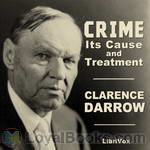 Crime: Its Cause and Treatment
Crime: Its Cause and Treatment
Clarence Darrow was an American lawyer. He remains notable for his wit and agnosticism, which marked him as one of the most famous American lawyers and civil libertarians.In this book, Darrow expands on his lifelong contention that psychological, physical, and environmental influences—not a conscious choice between right and wrong—control human behavior. To my ears (the reader's), the author has a rather simplistic behaviourist view of human behaviour, but he argues his position with wonderful clarity... | |
By: Orison Swett Marden (1850-1924) | |
|---|---|
 Pushing to the Front
Pushing to the Front
Published in 1894, this is the first book by the renowned inspirational author, Dr. Orison Swett Marden. Pushing to the Front is the product of many years of hard work, and marks a turning point in the life of Dr. Marden. He rewrote it following an accidental fire that brought the five-thousand-plus page manuscript to flames. It went on to become the most popular personal-development book of its time, and is a timeless classic in its genre. Filled with stories of success, triumph and the surmounting of difficulties, it is especially well-targeted at the adolescent or young adult... | |
By: J Hudson Taylor (1832-1905) | |
|---|---|
 Union and Communion - or Thoughts on the Song of Solomon
Union and Communion - or Thoughts on the Song of Solomon
This little book, whose design is to lead the devout Bible student into the Green Pastures of the Good Shepherd, thence to the Banqueting House of the King, and thence to the service of the Vineyard, is one of the abiding legacies of Mr. Hudson Taylor to the Church. In the power of an evident unction from the Holy One, he has been enabled herein to unfold in simplest language the deep truth of the believer's personal union with the Lord, which under symbol and imagery is the subject of The Song of Songs. (From the Foreword by J Stuart Holden). | |
By: Laurence M. Janifer (1933-2002) | |
|---|---|
 Supermind
Supermind
FBI agent Kenneth Malone lives in a world where psionic powers such as telepathy and teleportation exist. He must cope with them as well as an FBI Director who leaves Malone continually confused about what situation he is being asked to handle and what he is expected to do about it. Someone or something is causing confusion in the U.S. Government, Unions, The Mafia, and other sectors of society and Malone has been given the job of finding the source of the confusion. A good story composed of science fiction and slap stick comedy with a bit of romance thrown into the mix. | |
By: Patanjali | |
|---|---|
 The Yoga Sutras of Patanjali
The Yoga Sutras of Patanjali
Yoga sutras by Patanjali is a seminal work in yoga, this book is more about control of mind and the true goal of yoga. The sutras are extremely brief, and the translation in neat English makes it very easy for people to understand the ancient Sanskrit text. It starts with the birth and growth of spiritual man through the control of mind. In all, this is a "all in one" book for yoga philosophy written by the master himself. | |
By: Gustave Le Bon (1841-1931) | |
|---|---|
 Crowd
Crowd
"Civilisations as yet have only been created and directed by a small intellectual aristocracy, never by crowds. Crowds are only powerful for destruction. Their rule is always tantamount to a barbarian phase. A civilisation involves fixed rules, discipline, a passing from the instinctive to the rational state, forethought for the future, an elevated degree of culture — all of them conditions that crowds, left to themselves, have invariably shown themselves incapable of realising. In consequence of the purely destructive nature of their power crowds act like those microbes which hasten the dissolution of enfeebled or dead bodies... | |
By: Charles Waddell Chesnutt (1858-1932) | |
|---|---|
 Colonel's Dream
Colonel's Dream
In this novel, Chesnutt described the hopelessness of Reconstruction in a post-Civil War South that was bent on reestablishing the former status quo and rebuilding itself as a region of the United States where new forms of "slavery" would replace the old. This novel illustrated how race hatred and the impotence of a reluctant Federal Government trumped the rule of law, ultimately setting the stage for the rise of institutions such as Jim Crow, lynching, chain gangs and work farms--all established with the intent of disenfranchising African Americans. | |
By: John Berryman (1919-1988) | |
|---|---|
 Card Trick
Card Trick
The Psi Lodge had their ways and means of applying pressure, when pressure was needed. But the peculiar talent this fellow showed was one that even they'd never heard of...! | |
By: Thomas H. Burgoyne (1855-1894) | |
|---|---|
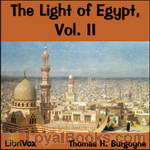 The Light of Egypt, vol II
The Light of Egypt, vol II
"The Light of Egypt" will be found to be an Occult library in itself, a textbook of esoteric knowledge, setting forth the "wisdom Religion" of life, as taught by the Adepts of Hermetic Philosophy. It will richly repay all who are seeking the higher life to carefully study this book, as it contains in a nutshell the wisdom of the ages regarding man and his destiny, here and hereafter. The London and American first edition, also the French edition, Vol. I, met with lively criticism from Blavatsky Theosophists, because it annihilates that agreeable delusion of "Karma" and "Reincarnation" from the minds of all lovers of truth for truth's sake. | |
By: Henry Drummond | |
|---|---|
 The Greatest Thing in the World and Other Addresses
The Greatest Thing in the World and Other Addresses
The spiritual classic The Greatest Thing In the World is a trenchant and tender analysis of Christian love as set forth in the thirteenth chapter of I Corinthians. The other addresses speak to other aspects of Christian life and thought. | |
By: Ralph Waldo Trine (1866-1958) | |
|---|---|
 In Tune with the Infinite
In Tune with the Infinite
Trine tells us that by connecting and harmonizing with the Universe we attract love, health, peace and success. Trines' writings may have been the most important to the "New Thought" movement of the late 1800's and early 1900's which was the forerunner to the "New Age" movement. | |
By: James Cardinal Gibbons (1834-1921) | |
|---|---|
 The Faith of Our Fathers
The Faith of Our Fathers
The Faith of Our Fathers: A Plain Exposition and Vindication of the Church Founded by Our Lord Jesus Christ is a book published in 1876 by archbishop James Gibbons, which became a best-selling conversion manual in the United States, and by 1980 was in its 111th printing.(From the preface) “The object of this little volume is to present in a plain and practical form an exposition and vindication of the principal tenets of the Catholic Church. It was thought sufficient to devote but a brief space to such Catholic doctrines and practices as are happily admitted by Protestants, while those that are controverted by them are more elaborately elucidated... | |
By: Charles B. Towns (1862-1947) | |
|---|---|
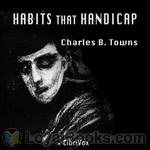 Habits that Handicap
Habits that Handicap
Habits that Handicap is one of three novels about alcholoism and drug addiction written by Charles B. Towns. Towns was an expert on alcoholism and drug addiction who helped draft drug control legislation in the United States during the early 20th century. He also founded the Towns Hospital in New York City, which aimed at drying out the well-to-do patient. | |